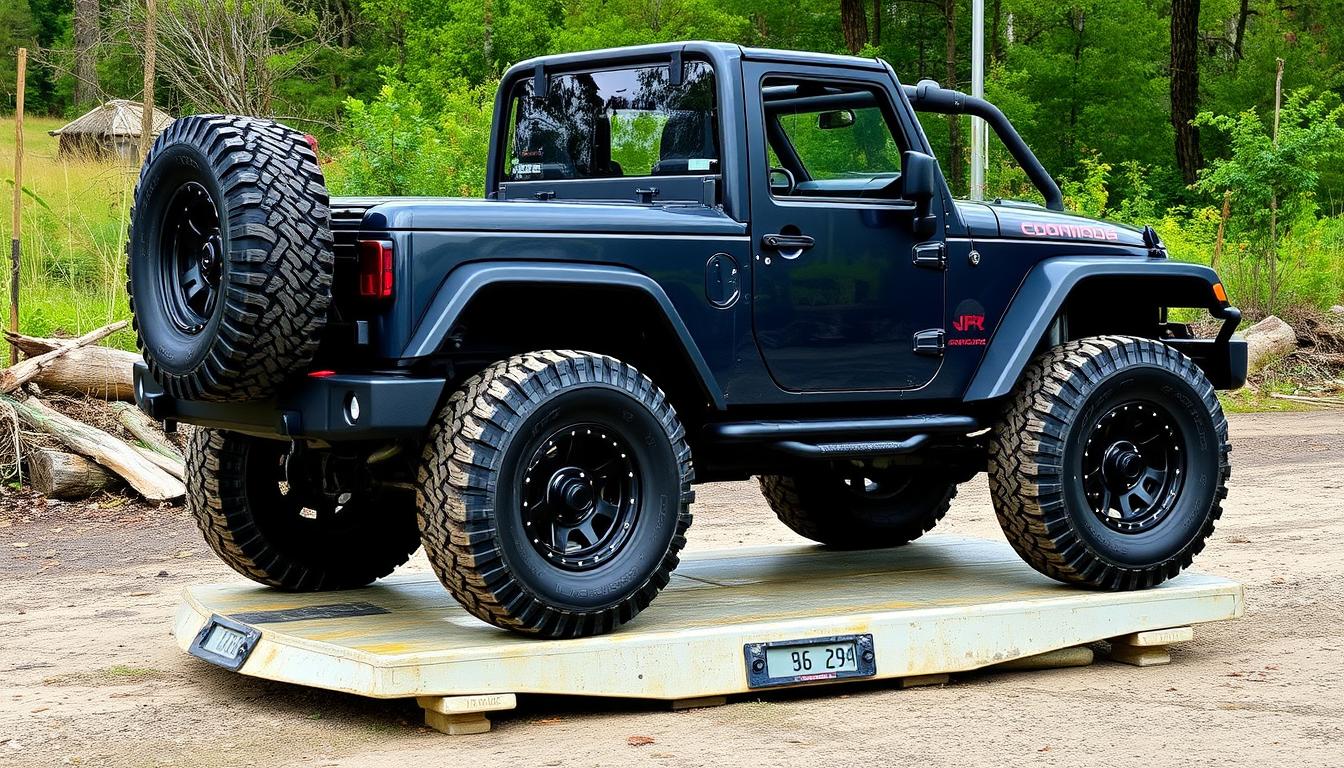The Jeep Wrangler is a favorite off-road vehicle, loved for its tough design and great performance. But, have you ever thought about how much it weighs? The weight of a Jeep Wrangler changes a lot based on the model, engine, and extra features. Knowing your Wrangler’s weight is key to getting the best out of it, from driving to off-roading.
In this detailed guide, we’ll look at the weight of different Jeep Wrangler models. We’ll talk about what affects the weight and how it impacts your Wrangler’s performance. Whether you’re a Jeep fan or thinking of getting a Wrangler, this guide will help you understand your vehicle’s weight and how it affects your drive.
Key Takeaways
- The 2023 Jeep Wrangler 2-door models weigh between 3,948 and 4,449 pounds, while 4-door models range from 4,449 to 5,103 pounds.
- The Jeep Wrangler 4xe Hybrid is the heaviest model, weighing between 5,100 and 5,400 pounds.
- Weight impacts the Wrangler’s performance, fuel efficiency, and off-road capabilities, so understanding the weight of your specific model is crucial.
- Factors like trim levels, optional features, and modifications can significantly affect the weight of your Jeep Wrangler.
- Proper weight distribution and understanding towing capacity are essential for maximizing your Wrangler’s capabilities.
Understanding Jeep Wrangler Weight Categories
Knowing the different weight categories of the Jeep Wrangler is key. The curb weight, gross weight, and payload capacity affect how the vehicle performs. They also impact fuel efficiency and off-road abilities.
Curb Weight vs. Gross Weight
The curb weight is the vehicle’s weight without passengers or cargo. It ranges from 3,948 to 5,103 lbs (1,791 to 2,315 kg). The gross weight includes the curb weight plus cargo and passengers. It can go up to 6,000 pounds (2,722 kg) for some models.
Payload Capacity Explained
The payload capacity is the max weight the Wrangler can carry safely. This includes passengers, cargo, and accessories. The 2023 Jeep Wrangler’s payload ranges from 880 to 1,351 pounds (399 to 612 kg), depending on the model.
Understanding the Jeep Wrangler’s weight categories is vital. It helps maximize performance, fuel efficiency, and off-road capabilities. Knowing the curb weight, gross weight, and payload capacity ensures safe and responsible use of the vehicle.
“Knowing the weight specifications of your Jeep Wrangler is essential for making the most of its capabilities, whether you’re tackling rugged terrain or hauling heavy loads.”
Average Weight of Different Jeep Wrangler Models
Jeep Wranglers vary in weight across models and years. This weight affects how well the vehicle performs, handles, and uses fuel. It’s a key factor for buyers to consider. Let’s explore the average weights of various Jeep Wrangler models.
2023 Jeep Wrangler Weight Overview
The 2023 Jeep Wrangler 2-door models weigh between 3,948 and 4,449 lbs. The 4-door models range from 4,449 to 5,103 lbs. These weights are similar to the 2022 Wrangler models.
Comparison of Older Models
Older Jeep Wranglers, before 2018, were lighter. The 2-door models weighed 3,760 to 3,970 lbs. The 4-door versions were 4,440 to 4,650 lbs.
Impact of Engine Type on Weight
The engine type greatly affects a Jeep Wrangler’s weight. V6 engines make the Wrangler heavier than 4-cylinder engines. This weight change impacts performance, handling, and fuel use.
| Model Year | 2-Door Curb Weight | 4-Door Curb Weight |
|---|---|---|
| 2023 Jeep Wrangler | 3,948 – 4,449 lbs | 4,449 – 5,103 lbs |
| 2022 Jeep Wrangler | 3,948 – 4,449 lbs | 4,449 – 5,103 lbs |
| 2021 Jeep Wrangler 4xe Hybrid | N/A | 5,100 – 5,400 lbs |
| Pre-2018 Jeep Wrangler | 3,760 – 3,970 lbs | 4,440 – 4,650 lbs |
The weight of a Jeep Wrangler can change based on the model, trim, and features. Knowing the average weights helps buyers choose the right Jeep Wrangler for them.
Factors Influencing Jeep Wrangler Weight
The weight of a Jeep Wrangler can change a lot based on a few important things. The trim level and extra features picked by the owner are key. These choices greatly affect the Wrangler’s weight.
Trim Levels and Their Weight Differences
The Jeep Wrangler comes in different trims, each with its own set of features. The Rubicon model, for example, is heavier than the Sport or Sahara trims. This is because it has bigger tires, skid plates, and heavy-duty suspension.
These extra parts can add 100-200 pounds to the Wrangler’s weight.
Optional Features That Add Weight
Customers can add many optional features to their Jeep Wrangler. These can make the vehicle much heavier. Big wheels, heavy-duty bumpers, winches, and roof racks are examples.
These can increase the Wrangler’s weight by up to 500 pounds, depending on the model.
Choosing between a hardtop and a soft top also affects the weight. Hardtops are about 100 pounds heavier than soft tops.
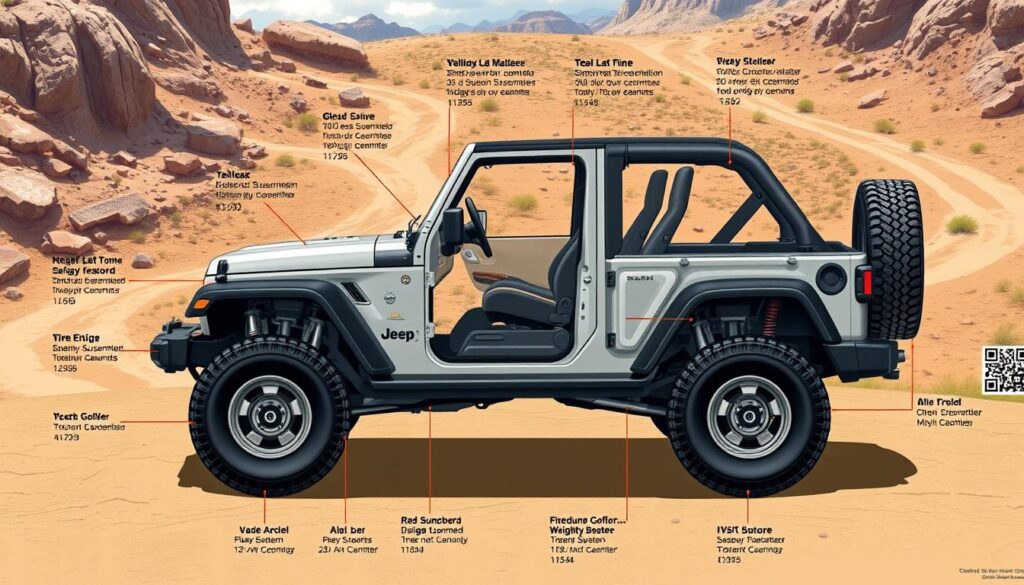
Knowing about these weight factors is important for Jeep Wrangler owners. The vehicle’s weight impacts its off-road ability, fuel use, and performance. By understanding how different trims and features affect weight, buyers can make better choices for their off-road vehicle.
Special Editions and Their Weights
The Jeep Wrangler is a legendary off-road SUV with many special editions. Each has unique features and designs. Knowing their weights is key for off-road fans and those wanting to boost their Wrangler’s performance.
Jeep Wrangler Rubicon Weight
The Jeep Wrangler Rubicon is made for serious off-roading. The 2023 2-door Rubicon weighs 4,449 lbs. The 4-door model is heavier, at 4,755 lbs. The Rubicon 392, with its V8 engine, is the heaviest at 5,103 lbs.
Jeep Wrangler Sahara Weight
The Sahara edition offers a smoother ride on paved roads. The 2023 2-door Sahara weighs 3,948 lbs. The 4-door version is 4,449 lbs. Special editions like Willys and High Altitude usually fall between the Sahara and Rubicon in weight.
| Jeep Wrangler Model | 2-Door Weight | 4-Door Weight |
|---|---|---|
| Rubicon | 4,449 lbs | 4,755 lbs |
| Rubicon 392 (V8) | N/A | 5,103 lbs |
| Sahara | 3,948 lbs | 4,449 lbs |

The weight of these special editions affects the Wrangler’s off-road performance and fuel efficiency. Knowing the Rubicon and Sahara’s weights helps buyers choose the best Wrangler for their needs.
Weight Considerations for Off-Roading
When you take your Jeep Wrangler off-road, weight matters a lot. It affects how well your vehicle performs and handles tough terrain. Managing weight is key for a safe and fun off-road adventure.
Importance of Weight Distribution
For off-roading, a 50/50 weight split between the front and rear is best. This balance ensures your Jeep SUV can handle obstacles and soft terrain well. Uneven weight can hurt your Wrangler’s angles, affecting its off-road skills.
Effects of Weight on Performance
The weight of your Jeep Wrangler impacts its off-road performance. Heavier vehicles might do better on some terrains but struggle in soft ones. Lighter Wranglers are more agile, making them better for tight spaces.

“It’s crucial to keep payload weight low to increase range, enhance steering and braking control, save payload for future use, and get unstuck faster.”
Weight also affects your Wrangler’s angles for tackling obstacles. It’s important to think about your vehicle’s weight and any changes you make. This ensures your Wrangler stays off-road capable.
Modifications and Weight Changes
Customizing a Jeep Wrangler is exciting, but think about how it changes the weight. Add-ons like bigger tires, lift kits, and armor can make the wrangler suv weight go up. This can affect how it drives and handles.
Common Add-Ons that Increase Weight
- Larger tires: 200-500 lbs
- Lift kits: 200-500 lbs
- Steel bumpers: 100-150 lbs
- Winches: 50-100 lbs
- Roof racks and cargo baskets: 50-150 lbs
Balancing Modifications with Performance
When modifying a jeep wrangler specs, balance is key. Too much weight can hurt its off-road and on-road skills. You might need to add better suspension and shocks.
Switching from steel to aluminum armor can cut down the weight. This makes the Jeep handle better and perform better overall. It shows how important it is to think about weight when making changes.
| Jeep Wrangler Model | Curb Weight | Payload Capacity |
|---|---|---|
| 2017 Jeep Wrangler 2D Sport | – | 1000 lbs |
| 2017 Jeep Wrangler 2D Rubicon | – | 892 lbs |
| 2017 Jeep Wrangler 4D Unlimited | – | 880 lbs |
| 2008 Jeep Wrangler 2D Sport | – | 1000 lbs |
| 2008 Jeep Wrangler 2D Rubicon | – | 1000 lbs |
| 2008 Jeep Wrangler 4D Unlimited | – | 1050 lbs |
Knowing how different mods affect weight helps keep the Jeep Wrangler great for off-roading. It’s all about finding the right balance.

How Much Weight Can a Jeep Wrangler Tow?
The Jeep Wrangler is known for its off-road skills. But it’s also great at towing. The 2024 Jeep Wrangler can tow up to 5,000 pounds. This makes it perfect for many towing tasks.
Towing Capacity Explained
The towing capacity of a Jeep Wrangler depends on the model, engine, and setup. Lower-rated Wranglers can tow up to 2,000 pounds. This is good for small loads like jet skis or a few dirt bikes.
But the top Wrangler models can tow up to 5,000 pounds. This lets you tow bigger items like medium-sized travel campers or a small horse trailer.
Important Towing Accessories
- Tow hitch: Essential for connecting the trailer to the Jeep Wrangler.
- Wiring harness: Ensures proper electrical connectivity between the Wrangler and the trailer.
- Trailer brake controller: Allows you to control the trailer’s brakes from the Wrangler’s cabin.
When towing, remember to add the weight of the Jeep, passengers, cargo, and trailer. This ensures you don’t exceed the Wrangler’s towing limit. Going over the limit can stress the Wrangler’s systems, affecting safety and performance.
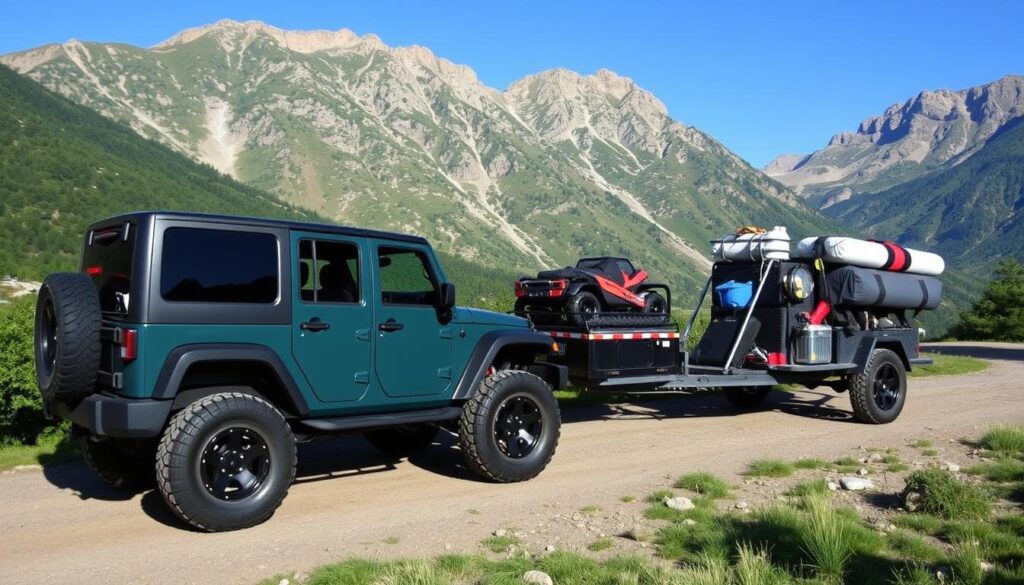
The Jeep Wrangler’s towing ability has improved over the years. The 2024 model has the highest towing capacity yet. Whether you’re towing a small trailer for a weekend or something bigger, the Jeep Wrangler is up to the task.
Weight and Fuel Efficiency Relation
The weight of a Jeep Wrangler greatly affects its fuel efficiency. Heavier Jeep Wrangler models use more fuel than lighter ones. For example, the 2023 Wrangler with a 2.0L 4-cylinder engine weighs about 3,760 lbs. It gets up to 22 mpg in the city and 29 mpg on the highway.
On the other hand, the heavier V6 models weigh between 3,951 lbs and 4,129 lbs. They average 17-19 mpg in the city and 23-24 mpg on the highway.
How Weight Affects Fuel Economy
The EPA says adding 100 pounds to a wrangler suv weight can lower fuel mileage by 1-2%. So, a Wrangler with 500 pounds more could see a 5-10% decrease in fuel efficiency.
Tips to Improve Fuel Efficiency
- Maintain proper tire pressure to reduce rolling resistance and improve fuel economy.
- Remove any unnecessary items or equipment from the Wrangler to reduce overall weight.
- Consider aerodynamic modifications, such as adding a roof rack or installing a tonneau cover, to enhance the vehicle’s efficiency.
- Explore engine tuning options that can optimize performance and fuel consumption.
While weight is a big factor in fuel efficiency, aerodynamics are even more important. For hypermilers, weight reduction might not significantly impact economy, as the biggest drag on most cars is aerodynamic rather than weight-related.
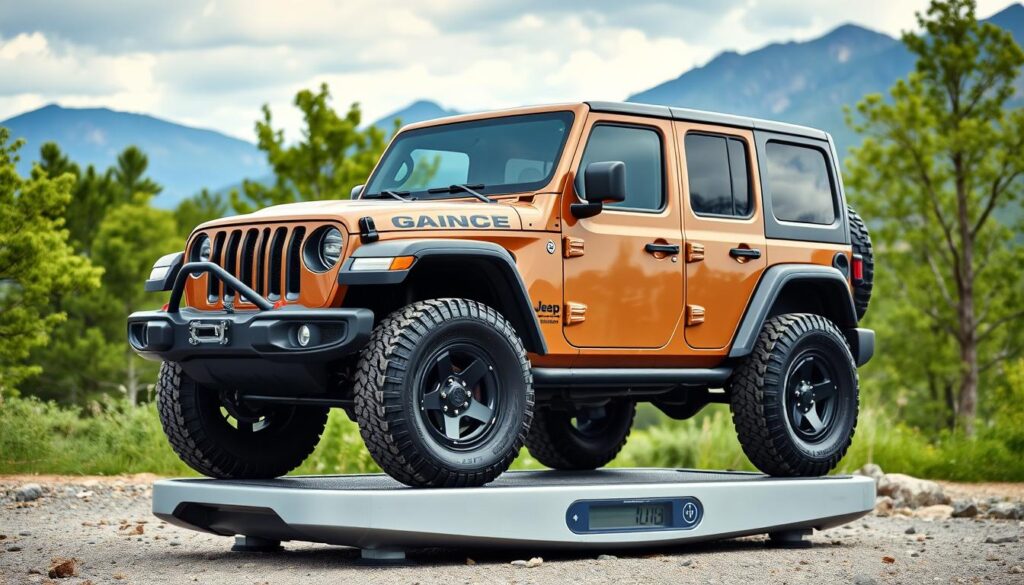
Understanding how jeep wrangler weight and fuel efficiency are connected helps owners make better choices. It also allows them to make adjustments to improve fuel economy.
Cargo Space: Weight Implications
Understanding the cargo space and weight of the Jeep Wrangler is key. The 2-door Wrangler has up to 31.7 cubic feet of space when the rear seats are folded. The 4-door model offers even more, with 72.4 cubic feet of space.
Maximum Cargo Capacity
The Wrangler’s cargo space is impressive, but weight limits are important. The payload capacity varies, from 880 to 1,351 pounds, depending on the model. It’s vital to keep the total weight of passengers, cargo, and accessories under the vehicle’s limits.
Safe Loading Practices
When loading the Wrangler, spread the weight evenly and secure items well. Going over the GVWR or axle weight ratings can harm the vehicle’s performance. Always check the Wrangler’s weight limits in the specs or owner’s manual for safe use.
| Jeep Wrangler Model | Cargo Volume (rear seats folded) | Maximum Payload Capacity |
|---|---|---|
| 2-door Jeep Wrangler | 31.7 cubic feet | 880 – 1,351 pounds |
| 4-door Jeep Wrangler | 72.4 cubic feet | 880 – 1,351 pounds |
Knowing the Wrangler’s cargo space and weight limits helps owners load safely. This ensures a fun and safe drive, whether on off-road trails or daily tasks.
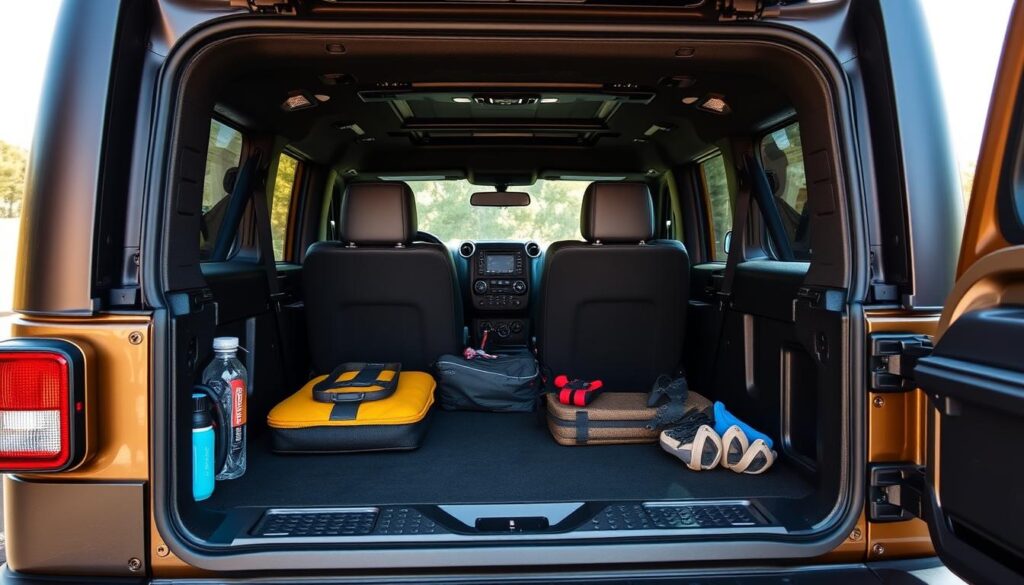
Real-World Weight Measurement
Knowing your Jeep Wrangler’s weight is key to understanding its performance and fuel use. The weight can change based on modifications and accessories you add. So, the weight listed by the manufacturer might not always match your Wrangler’s real weight.
How to Weigh Your Jeep Wrangler
To get your Wrangler’s weight right, use a vehicle scale at a truck stop or public weigh station. It’s best to weigh it when it’s full of gas and has all your usual stuff. Remember, any changes or extras you’ve added can change the weight a lot.
Using Weigh Stations Effectively
When at a weigh station, follow the instructions closely. Weighing your Wrangler a few times can give you the most accurate weight. This helps you spot any differences and understand your vehicle’s weight better. Also, check the station’s hours and any special rules they might have.
“Knowing the precise weight of your Jeep Wrangler is crucial for maintaining optimal performance, safety, and compliance with regulatory requirements.”
By accurately weighing your Wrangler, you can make better choices about what to add or change. This ensures your vehicle runs well, whether on the road or off it.
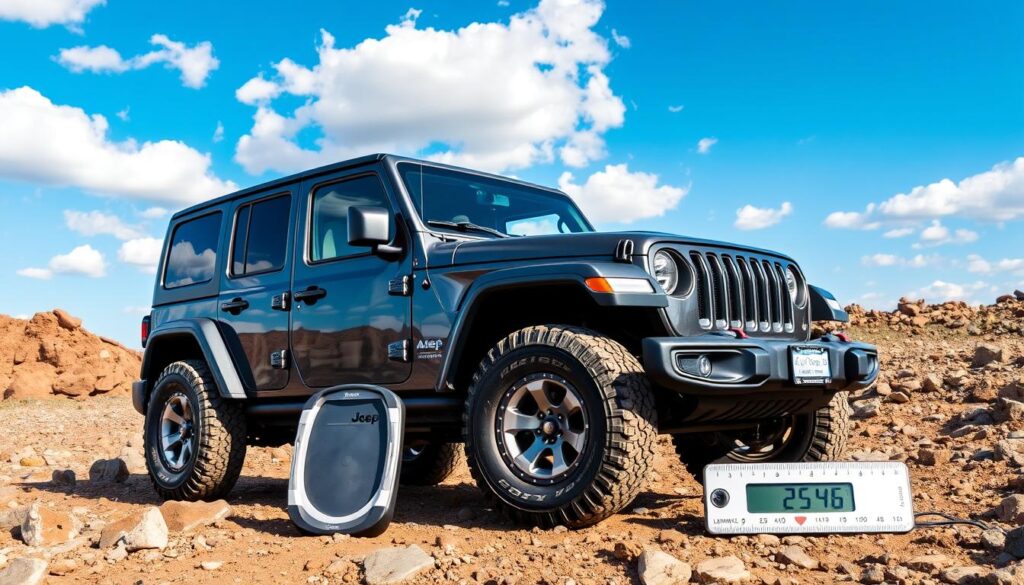
Jeep Wrangler Weight Regulations
Jeep Wrangler owners need to know about weight rules for their off-road vehicles. It’s key to follow these guidelines for legal and safe driving. This is true, even when making changes or towing.
Understanding Legal Weight Limits
The Gross Vehicle Weight Rating (GVWR) for Jeep Wranglers is between 5,000 to 6,000 pounds. This depends on the model. It’s the max weight the vehicle can handle, including its own weight, people, stuff, and extra gear.
State-Specific Regulations to Consider
- Some states have extra rules for lifted or changed Jeep Wranglers. This can change the legal weight limits.
- Make sure to check your local laws and rules. This ensures your Jeep Wrangler fits the needed specs.
- Not following weight rules can lead to fines, penalties, or problems with registration and insurance.
Before making any changes to your Jeep Wrangler, think about how it will affect the weight. Make sure it stays within legal limits. By knowing and following weight rules, Jeep Wrangler owners can have fun off-road while staying safe and legal.
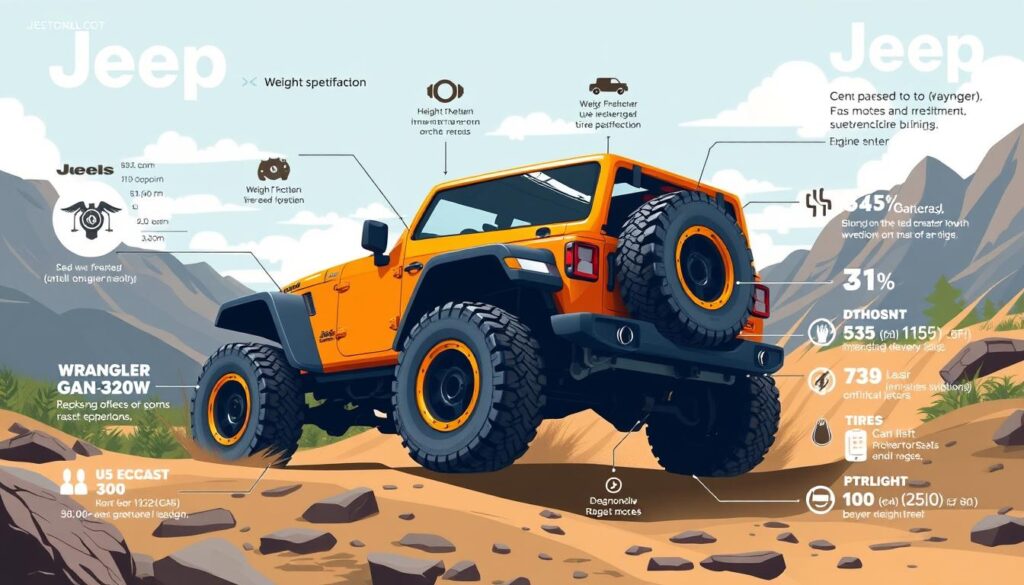
Conclusion: The Importance of Knowing Your Wrangler’s Weight
In this guide, we’ve looked into the Jeep Wrangler’s weight. We’ve covered curb weight, gross vehicle weight rating, and how engine type and trim level affect it. Knowing your Wrangler’s weight is key for its performance, safety, and legal compliance.
Summarizing Key Points
The Jeep Wrangler’s weight varies, from 3,948 pounds for a two-door Sport to over 5,200 pounds for a four-door Rubicon with a hybrid engine. The weight impacts its fuel efficiency, off-road skills, and towing capacity. These can range from 2,000 to 3,500 pounds. It’s vital to know these weights for making smart choices about modifications, loading, and safe driving.
Final Thoughts on Weight Matters
In the Jeep Wrangler world, weight is more than a number. It affects your driving, maintenance, and overall joy of owning one. By knowing your Wrangler’s weight and keeping an eye on it, you ensure it performs well, stays safe, and meets legal standards. Whether you love off-roading or just drive to work, understanding your Wrangler’s weight unlocks its true potential and brings you the excitement of a Jeep ride.
FAQ
What is the typical weight range for a Jeep Wrangler?
What is the difference between curb weight and gross weight for a Jeep Wrangler?
How do older Jeep Wrangler models compare in weight to the newer ones?
How does the engine type affect the weight of a Jeep Wrangler?
What factors influence the weight of a Jeep Wrangler?
How do the weights of different Jeep Wrangler trims compare?
How does the weight of a Jeep Wrangler affect its off-road performance?
How much weight can a Jeep Wrangler tow?
How does the weight of a Jeep Wrangler affect its fuel efficiency?
What is the cargo capacity of a Jeep Wrangler?
How can I accurately weigh my Jeep Wrangler?
What are the legal weight regulations for a Jeep Wrangler?
Source Links
- https://en.wikipedia.org/wiki/Jeep_Wrangler_(JL)
- https://jeepeasteregg.com/2024/10/17/how-much-does-a-jeep-wrangler-weigh/
- https://en.wikipedia.org/wiki/Jeep_Wrangler_(JK)
- https://www.northgatechryslerdodgejeep.net/research/new-jeep-wrangler-dimensions-weight.htm?srsltid=AfmBOoryBaxPHjoaLsNhNRfy5hxG42ePDi4P9oOLSmmsj4z28w5x9GsX
- https://doorinsights.com/how-much-does-a-jeep-wrangler-door-weigh/
- https://simpletire.com/learn/tire-buying-guides/jeep-wrangler?srsltid=AfmBOoogpg4XtVLfWLuX6wurYs0xXVTtdqg7mE9EOaE2thX6ebWex7rH
- https://www.capitalone.com/cars/learn/finding-the-right-car/the-beginners-guide-to-taking-your-ford-bronco-or-jeep-wrangler-offroad/1553
- https://www.thelonejeeper.ca/1-Jeep-JK-Weight-Balance-vs-Payload.html
- https://www.jeepforum.com/threads/adding-weight-and-handling.1377107/
- https://www.waldorfchryslerjeep.com/jeep-wrangler-towing-capacity.html
- https://bicemotors.com/jeep-wrangler-towing-capacity.htm
- https://www.clementchryslerdodgejeepramcolumbia.com/jeep-wrangler-towing-capacity.htm
- https://s3.amazonaws.com/chryslermedia.iconicweb.com/mediasite/specs/2013_SP_Wrangler.pdf
- https://www.norristownchryslerdodge.com/new-Norristown-2024-Jeep-Wrangler-4 DOOR SPORT S 4xe-1C4RJXN60RW145821
- https://ecomodder.com/forum/showthread.php/how-much-does-weight-actually-effect-fuel-consumption-35430.html
- https://donmontalvo.com/2021/04/13/cat-scales-and-gvwr/
- https://www.darcars.com/jeep-gladiator-vs-jeep-wrangler.html
- https://www.overlandbound.com/forums/threads/how-heavy-is-your-overlanding-jku.37907/
- https://www.jkowners.com/threads/35-vs-37-weight-size-or-both-that-is-harder-on-your-jeep.320210/
- https://www.northgatechryslerdodgejeep.net/research/new-jeep-wrangler-4xe-dimensions-weight.htm?srsltid=AfmBOopIr5Hn9Ni5Tbzu1prqGE2tcf7YOHN–G4UwuJgvH1pGXJecYse
- https://www.rhinousainc.com/blogs/news/wrangler-vs-rubicon?srsltid=AfmBOor9xXkstR009RlmH3kcUBej40KjtaiD-Q3VNRvFdc7VV9nOEiqH
- https://www.autodna.com/blog/best-years-for-jeep-wrangler/

Jack Thompson is a writer and seasoned auto mechanic with over 15 years of experience in the automotive industry. Known for his expertise in vehicle mechanics, Jack has a deep understanding of car and truck systems. His skills, honed through years of hands-on experience, have made him a trusted name in the field. Jack is committed to providing valuable insights into car maintenance and repair, helping vehicle owners keep their vehicles in top condition.

